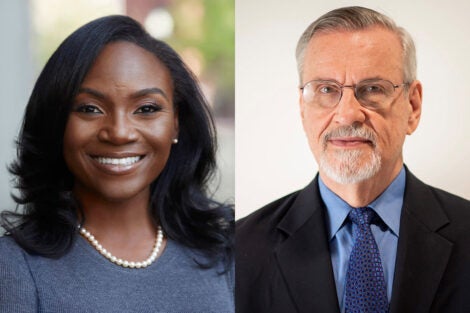December 19, 2023 – RSV, COVID-19, and flu—the season’s most worrisome respiratory viruses—were the focus of an hour-long Instagram Live conversation on December 14 between top vaccinologists Kizzmekia Corbett-Helaire and Barney Graham. The conversation included topics such as how viruses make people sick, how vaccines work, vaccine safety, and how to stay safe when there are lots of viruses circulating.
Corbett-Helaire and Graham previously worked together at the National Institute of Health’s Vaccine Research Center, where they conducted groundbreaking research that led to the development of COVID vaccines. Corbett is now an assistant professor of immunology and infectious diseases at Harvard T.H. Chan School of Public Health and Graham is senior advisor for global health equity and professor of medicine and microbiology, biochemistry, and immunology at Morehouse School of Medicine.
Corbett-Helaire and Graham spent much of the hour talking about RSV, or respiratory syncytial virus, which can be particularly dangerous to babies and young children and to older people. Graham explained that babies are susceptible because their immune systems are just beginning to form, and older people are susceptible because their immune systems are waning. That’s why it’s important for these groups to get the new RSV vaccine, he said.
Corbett-Helaire noted that an older person who gets the RSV vaccine is about 85% less likely to get a severe RSV infection. “That is whopping,” she said. “It is an absolutely astonishing vaccine.”
Graham said that there are two ways to protect babies from RSV—either by giving a pregnant woman the RSV vaccine, so that she develops antibodies that get passed to her baby through the placenta, or by giving the baby an injectable monoclonal antibody that can provide protection for five to six months.
Graham also talked about how to tell if a baby may have RSV. “All babies have a drippy nose half their life,” he said. “But if a baby starts breathing very fast, and if you look at their chest and they take a breath, and the places in between their ribs are pulled in, that’s a sign that the baby is really struggling. That is when you probably need to go see a physician and get some help.”
While the ideal time to get vaccinated for RSV, COVID, or flu is in September or October, Corbett-Helaire noted that “the season for these viruses sometimes lasts well into March. So if you want to be protected, especially against severe disease, you should go get your vaccines as soon as possible.”
Graham talked about how the RSV vaccine was developed, with the help of technology that enabled scientists to see atomic-level detail of how the virus was structured. And he described the lengthy process required to ensure the vaccine’s safety, including randomized trials involving thousands of people around the world.
Corbett-Helaire took questions from listeners. One asked what high school or undergraduate students could do to become vaccine scientists in the future.
Corbett-Helaire urged young people to seek out opportunities to learn about the field, noting that there are summer programs at Harvard Chan School and Morehouse and internships at the NIH. Graham added, “I really hope to see more young people looking at [the field of] biology and what it has to offer, because if we can make people healthier, everything would be better for everyone.”
Learn more
Vaccinologist Kizzmekia Corbett-Helaire on COVID-19 vaccines, boosters, and more (Harvard Chan School news)
Kizzmekia Corbett is just getting started (Harvard Public Health)
